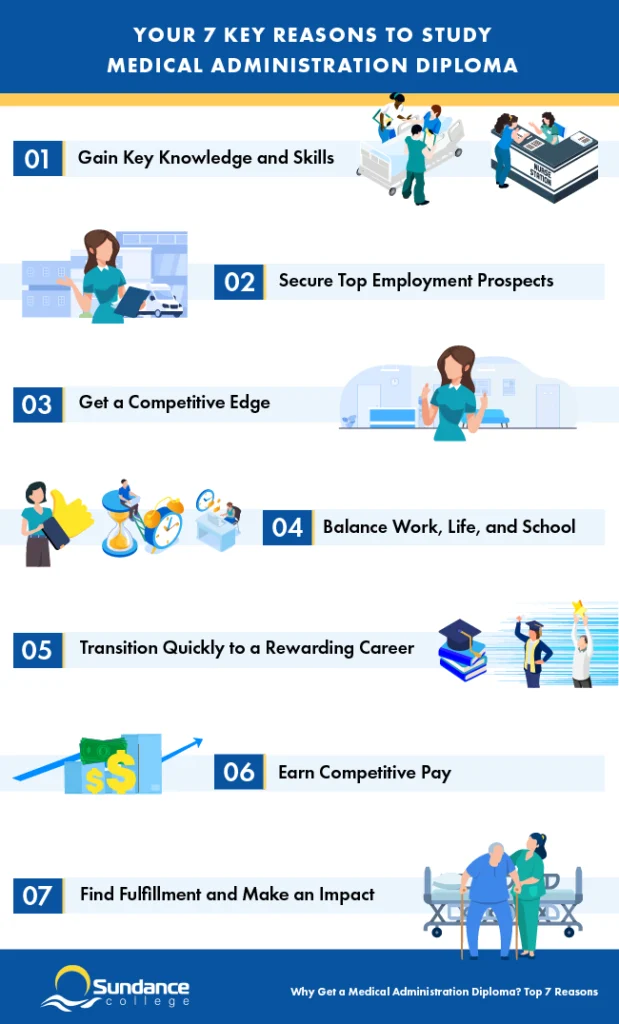Blog / Why Get a Medical Administration Diploma? Top 7 Reasons
Why Get a Medical Administration Diploma? Top 7 Reasons

Medical Office Administration – Health Unit Coordinator Diploma
- Medical Receptionist
- Medical Secretary
- Medical Office Assistant
- Hospital Unit Clerk
Table of Contents
Are you considering a career that combines the diverse and rewarding field of healthcare with the organizational skills of administration? If you’re asking yourself, “Why should I choose a Medical Office Administration Diploma?”, you’ve come to the right place.
This diploma offers a path to a meaningful career that combines the stability of a high-demand field with the opportunity to make a difference. The healthcare industry continues to expand, and the need for skilled administrative professionals continues to grow.
Listen to “Why Study Medical Administration Diploma? Your Top 7 Reasons”
Is Medical Office Administration an In-Demand Career?
Absolutely. The healthcare sector is experiencing continuous growth, and with it, the need for skilled medical office administrators is rising. From 2022 to 2031, there will be 39,400 job openings for these roles in Canada, but only 33,100 new job seekers, creating a talent gap of 6,300. This high demand ensures excellent employment prospects for those with the right qualifications.
1. Access Excellent Employment Prospects
Earning a Medical Office Administration (MOA) diploma can lead to promising opportunities in the healthcare sector. With more job openings than qualified candidates, this diploma gives you an advantage in the job market, helping you become a medical office administrator and secure a lasting career.
2. Gain Comprehensive Knowledge and Skills
There are two-in-one programs, such as the Medical Administration – Health Unit Coordinator diploma from Sundance College, that prepare you for both medical office assistant and unit clerk roles.
You’ll gain practical knowledge and skills in:
- Anatomy
- Medical terminology and transcription
- Health care billing
- Clinical procedures
- Essential administrative tasks
These combined programs equip you with the medical office administrative skills required to confidently pursue your new career in healthcare.
3. Achieve a Competitive Edge with a Recognized Qualification

Having a Medical Office Administration and Health Unit Coordinator diploma from a well-regarded institution signals to employers that you can handle medical administration duties and responsibilities on a daily basis with the proper quality and efficiency. That gives you a competitive edge in the job market.
4. Enjoy a Better Work-Life-School Balance with a Flexible Schedule
One of the key advantages of pursuing medical office assistant courses from a reputable career college is the flexibility it offers. For example, programs that are designed with a modular-based learning system where you focus on one course at a time, are ideal for adults with busy schedules.
You can choose between online, in-person, or both formats, with theory online and practical training on-campus.
Additionally, a career as a medical office assistant offers its own flexibility once you earn your MOA diploma. Many roles offer flexible full-time or part-time schedules, allowing you to balance work with your lifestyle.
5. Make a Quick Transition into a Rewarding Career
A Medical Office Assistant diploma allows for a fast career change. At Sundance College, you can complete the program in just 43 weeks (about 10 months), including a 5-week practicum in a medical setting.
Anuradha A., Sundance College’s Medical Office Administration program instructor, adds:
“The diploma opens doors to various medical environments, such as Workers’ Compensation Board (WCB) offices, clinics, long-term care, home health, hospitals, correctional facilities, and even law firms specializing in medical cases.”
6. Earn a Competitive Salary with Health Benefits
Medical office administrators can earn on average up to $30.47 per hour, which is almost two times higher than a Canadian federal minimum of $17.30 per hour. Add health benefits most MOAs enjoy, and you’ll see how financially stable and secure this career can be.
7. Experience Personal Fulfillment and Make a Positive Impact
With a medical administrative assistant diploma, you will directly help patients receive the care they need, contributing to their well-being and satisfaction, which is one of the most rewarding aspects of this role.

What You Learn in a Medical Office Administration Diploma Program
A Medical Office Administration diploma program offers the essential knowledge and practical skills needed to thrive in healthcare settings. Students gain expertise in medical terminology, office procedures, computer applications, and communication, equipping them to support medical teams and handle daily operations effectively.
This program prepares graduates for entry-level positions with a comprehensive skill set that meets the needs of today’s fast-paced healthcare environments.
Core Subjects and Skills Covered
A Medical Office Administration diploma provides students with the foundational skills needed for modern healthcare settings. Such as:
- Medical Knowledge: Courses in anatomy, medical terminology, and medical transcription build a strong foundation in healthcare language and processes.
- Administrative Skills: Training in office procedures, electronic health records (EMR), billing, and unit clerk tasks equips students to handle patient registration, scheduling, and essential office tasks efficiently.
- Computer Skills: Hands-on experience with Microsoft Office applications (Word, Excel, Outlook) prepares students for document management, data handling, and professional communication.
- Communication & Professionalism: Courses in interpersonal skills, business English, and career management help students communicate effectively, interact professionally, and succeed in job searches.
With these skills, graduates like Lucie M. (pictured earlier), Medical Office Administration, are well-prepared to provide critical technical, organizational, and interpersonal support that help medical teams operate more effectively.
Our team is ready to answer all your questions and help you make the best decision for your successful future in medical administration – just fill out this form.
Related Blogs
Subscribe for more career advice
Blog Categories
Share on:
